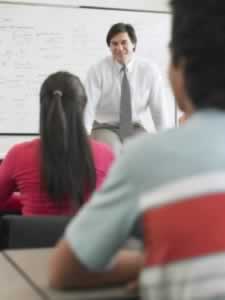Our individual explorations of research are essential for us to undertake if we want to give our students the best education we can
 When was the last time you allowed yourself to think deeply about the big picture of education and let your mind be free of the stress of the school day? When was the last time you let yourself wander off into the world of possibilities?
When was the last time you allowed yourself to think deeply about the big picture of education and let your mind be free of the stress of the school day? When was the last time you let yourself wander off into the world of possibilities?
If I told you that education research can do that for you, would you believe me?
It can seem like everything in education roles downhill to the classroom teacher; federal, state and district mandates force our administrators to demand more of us and it seems like parents, school boards and the public expect more and more as well.
It is easy to forget that we are all focused on the same goal: our students.
In the course of our busy workdays and our busy lives, we can lose perspective and lose our ability to perceive what is really going on, and in so doing, remember why we found our way to education in the first place. This is why there are thousands of education researchers who have devoted their careers to examining possibilities, opening doors to new ideas and seeking out ways to improve the lives of students and teachers.
(Next page: Exploring new research)
There was a time when the field of education research yielded questionable results. Studies lacked accuracy and findings were evaluated in biased ways that sometimes led to negative consequences and education research took on a poor reputation as being unscientific. However, the past two decades have led to stringent and exacting standards for research and stemming from these changes, truly important, useful and interesting findings are finally helping to improve our ability to educate.
Take time to explore new research and be rewarded by what you find. Seeking out new research is stimulating and can open up the door to new ideas, new techniques and new tools. It is centering to our mission as educators and inspiring, especially when it supports the techniques we know work; it validates our classroom practices and validates our effectiveness as teachers.
Our individual explorations of research are essential for us to undertake if we want to give our students the best education we can.
When investing time in research results and sharing the information with our colleagues it is important to dispel antiquated myths that researchers don’t know actually takes place in the classroom or that research is not trustworthy.
Often, it can feel selfish to take time for ourselves to look beyond the students and the constraints of the day, but what happens when we step back to see ourselves, our role, in the bigger picture of education? What happens when we put ourselves back into the same mindset our students take on every day as the curious learner? What will we find when we take a look outside the walls of our schools and classrooms?
Josh Jessen is a former public school teacher, doctoral student and Grants Specialist in the College of Education at the University of Nebraska at Omaha. He has taught in three states and worked with students in Kindergarten through college. The focus of his studies are on narrowing the gap between research and classroom practice in public schools.
- How to find perspective and purpose in education research - June 5, 2014

